
In the late 90s, Windows 3D Space Cadet Pinball, or simply "Pinball", took the "digital" world by storm. The game was especially popular in school computer labs, with school kids sneaking in a moment to play the forbidden game, before a teacher would catch them and banish them from the lab. After all, computers were only meant for using MS Paint and MS Word.
Fast forward three decades and computers now come in pocket friendly take-me-anywhere/everywhere size- the "smart" phones. It is a far more sophisticated machine than the 90s' hotshot desktop that needed furniture of its own to be housed in. These brick sized objects today can have the semblance of a humanlike "mind"- artificial intelligence.
This changes the way we seek knowledge and judge intelligence in the education system. Educational institutes and their students are under a new omni-present, allegedly "all-knowing" entity that is a prompt away.
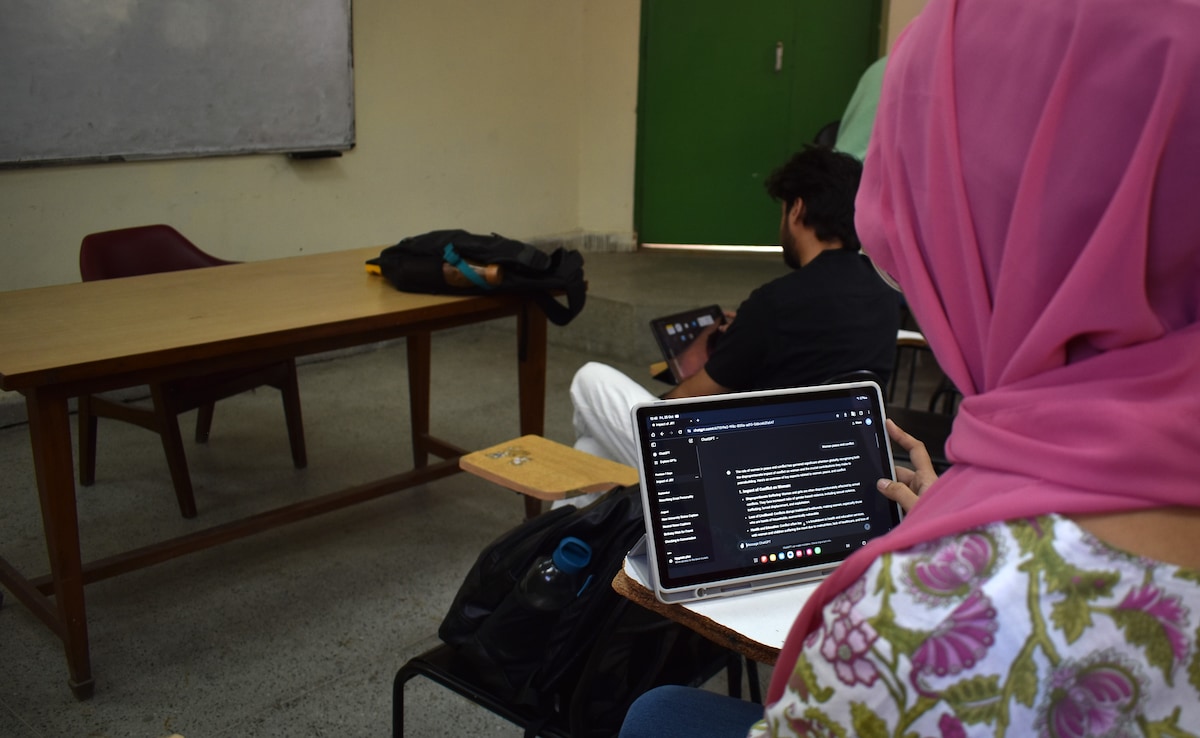
Students use AI tools like ChatGPT inside classrooms. Photo Credit: Zaid Nazir
"There was a wave of ChatGPT around that time. Har koi kehta tha... assignment hai? ChatGPT mai daldo (everyone would ask, do you have an assignment? put it in ChatGPT)," says Riya, a French language bachelor's student in a reputed central university in the capital city of New Delhi.
Riya started using ChatGPT a year ago, after resisting the temptation for months fearing over-reliance. "I used to think I wouldn't use AI (Artificial Intelligence) for classwork when I was in high school. I was scared of doing it again and again, and that is exactly what happened in college."
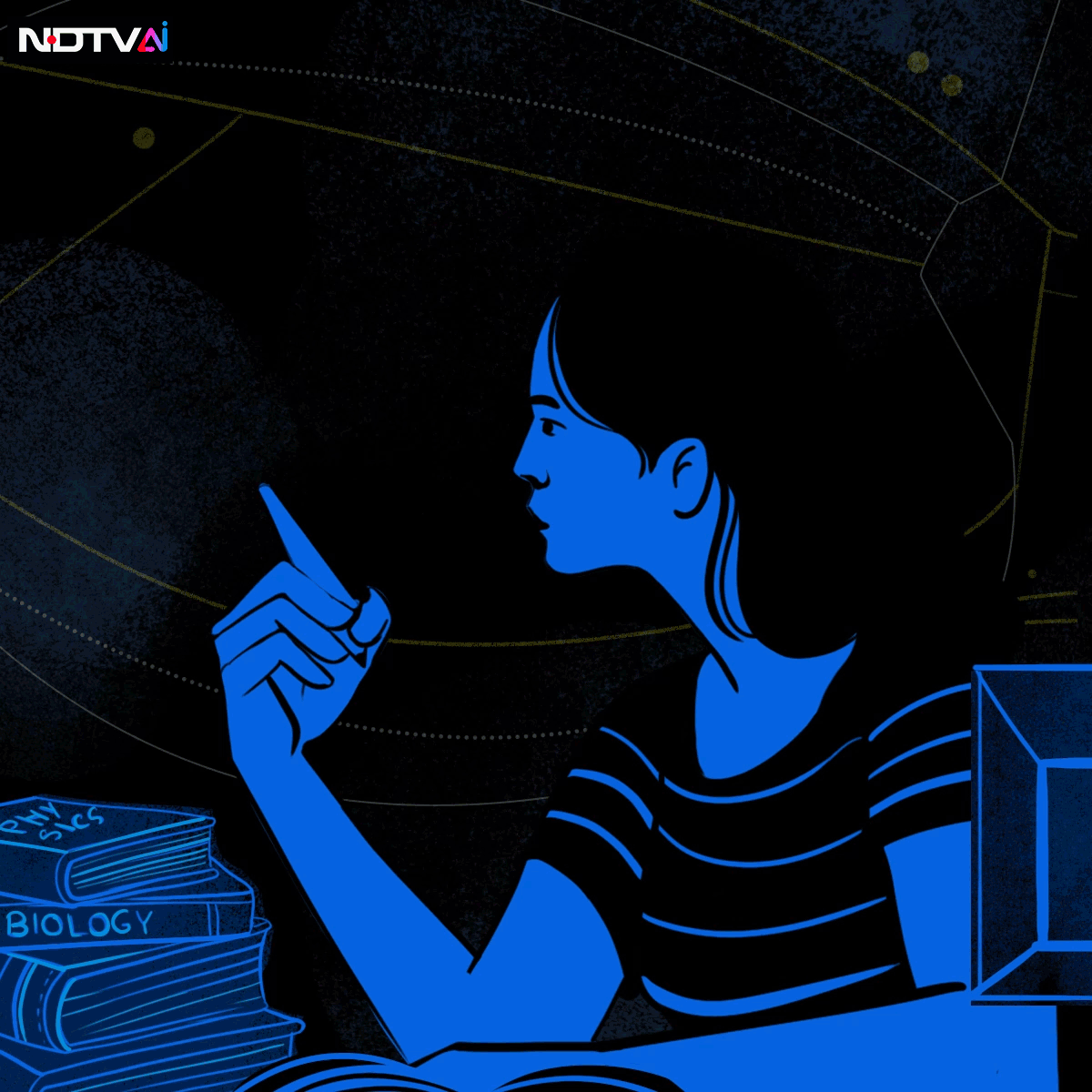
ChatGPT, the popular AI Chatbot from OpenAI, mainstreamed Artificial Intelligence like never before when it took the internet and the world by a stealthy surprise in November 2022. It became an overnight sensation, amassing a record million users within a week, and a 100 million within two months of its release.
Today, India has the highest proportion of population using ChatGPT, according to a Boston Consulting Group report titled CCI Global Consumer Sentiment Survey of 2023. The US, however, has the greatest number of users (estimated 15-20 million), with India coming a close second with at about 15 million estimated users. Amongst these users, students are a big proportion.
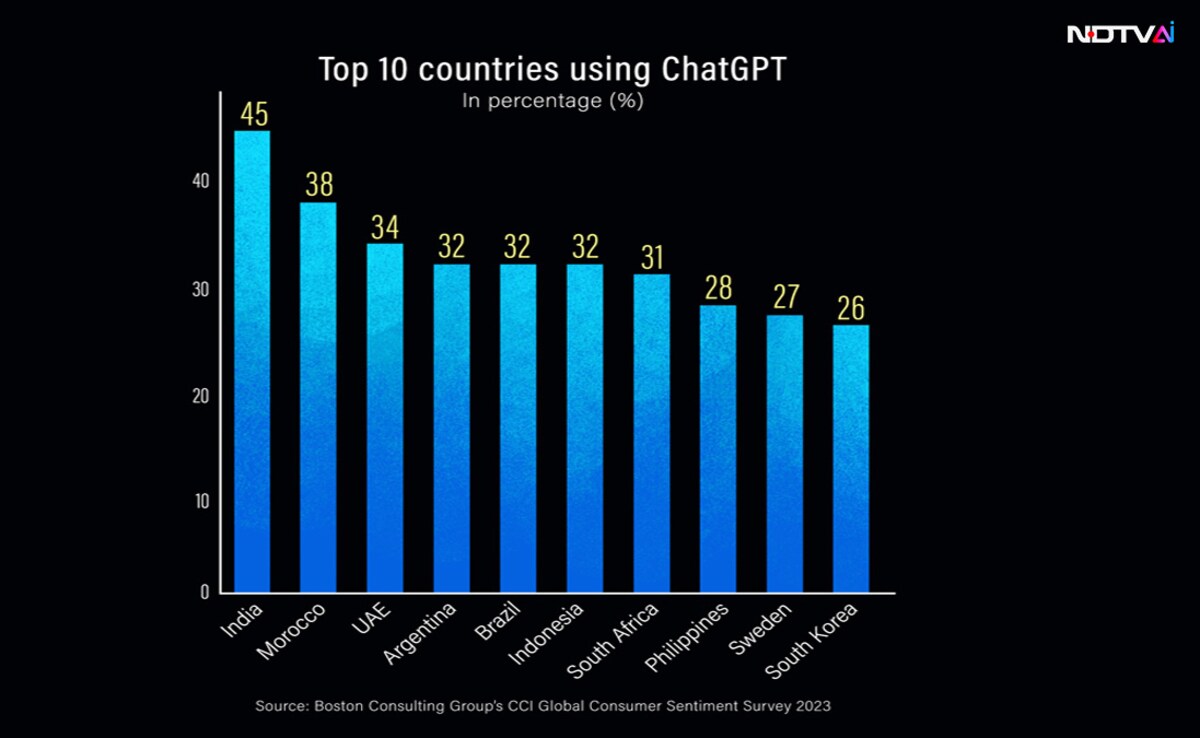
"ChatGPT is a constant, I use it every day," says Aashna, who is a first year bachelor's student of Sociology. "I don't think it's ethical but I'm guilty!" an admission that echoes amongst many of Aashna's peers as well. She adds, "There are apps like Humaniser AI, that make it (AI generated content) sound more human and evade detection." What makes Aashna stop and question ChatGPT is not questioning its ethics, but "I'm a perfectionist though, so I use multiple sources."
About 20 km away, Gagan and Seema share a similar tale at a Delhi University South Campus college just out of elections. "Only yesterday, I was working on two assignments, and I thought it was going to be time consuming. But then I chatGPT-ed it and I finished it in a whip," said Seema, adding with a footnote of criticism- "It is bad at hindi though."
But it is not only about a quick fix to homework blues. "A teacher is not always available, like when I have a doubt usually at night, a day before the exam, I can't ask my teacher," Vishal, a first-year engineering student said, sitting in the canteen with classmates who are unanimous about AI's knight in shining armour status.
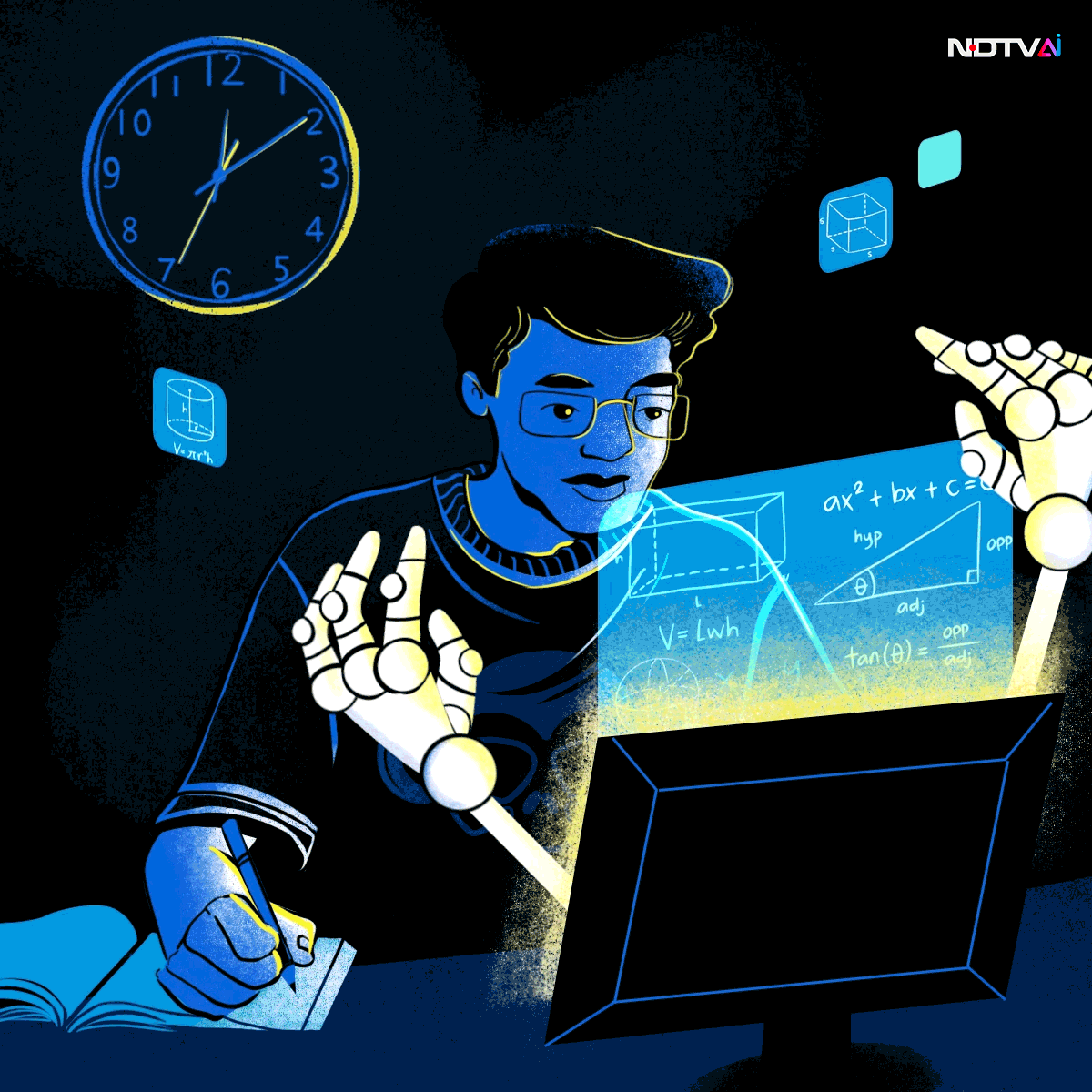
"I asked Meta AI to explain a physics question to me, and it explained to me like a teacher would. The numerical question had stated that the object was at ground level, and AI took pains to explain to me that the potential energy in this question would be zero. It could have chosen to ignore that detail, but it explained everything to me step-by-step," said Mayank, Vishal's classmate, as others nodded in agreement.
Artificial Intelligence, or its most popular avatar ChatGPT, could not have come at a better time. Just when the world had started to switch back on again, post a hostile virus that took the entire planet hostage, the OpenAI genie rose to the occasion. It arrived upon a world where zoom calls were no longer an anomaly but a norm, and classrooms were no longer the ones you walk into, but the ones you log into.
"We have to submit our assignments on google classroom, and no professor has caught us (using ChatGPT) yet," says Mayank. "I use this AI website, the name of which I can't seem to remember right now. I use ChatGPT to get the assignment text done and put it in there, and it gives me a handwritten script for it that looks completely real. We submit that directly and I don't even have to go through the pain of writing it down," explained Vishal.
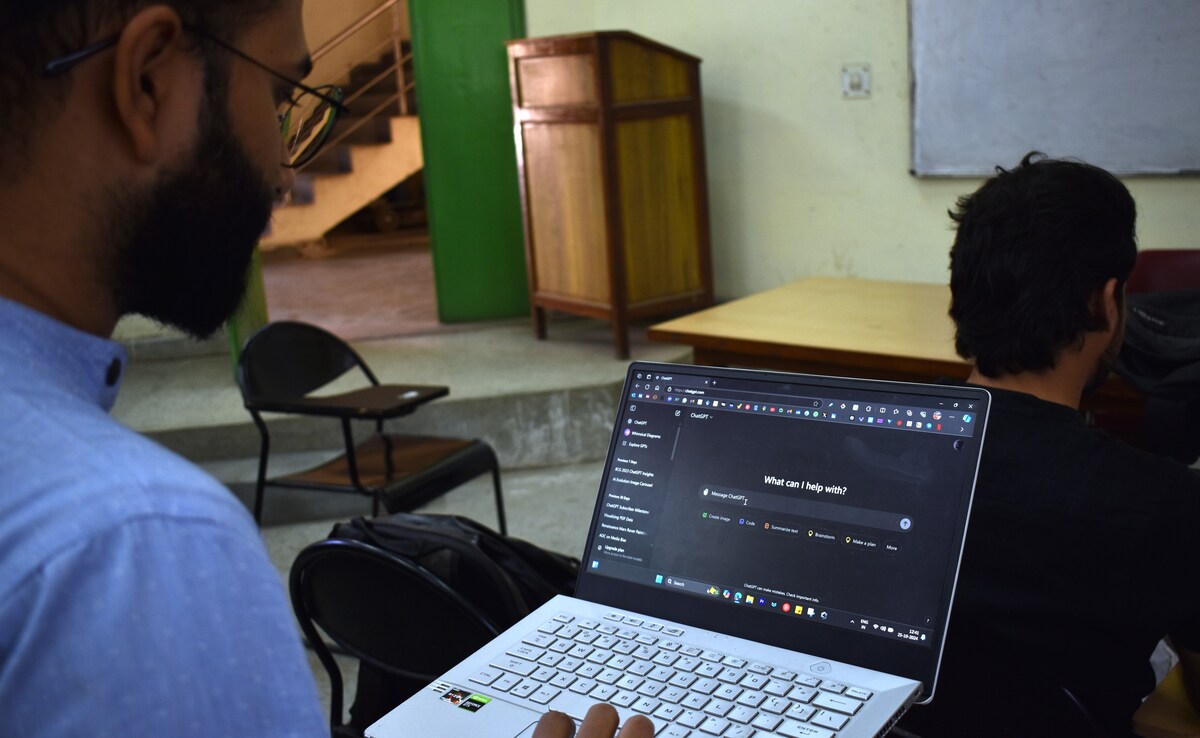
ChatGPT is the most popular AI Chatbot amongst college students. Photo Credit: Zaid Nazir
But do students think it is fair to use ChatGPT for classwork? Or is it a matter of just not getting caught? Is AI cheating? Is it fair if your classmate scores an A grade on an assignment using AI, while you struggle?
"If I wouldn't have taken out my phone and used ChatGPT in my exams, I wouldn't have made it to the fifth semester," admits Farhan, a final year psychology student. Farhan was caught cheating with ChatGPT once but was let off, because of his self-declared "honesty" or perhaps the fact revealed later in the conversation - "the dean is a family friend."
Others do not think it is cheating at all. "I think it's totally ethical," says Muskaan, Farhan's friend and a BA Program final year student. " I think the problem is that your productivity gets low. You don't use your mind when ChatGPT does it for you," she adds.
Mayank, from the engineering roundtable, said, "We anyway copy from books or from practical (lab) notebooks. Using AI is just more efficient." Riya, a French language student, said, "As long as you are not cut-copying, I think it is ethical."
Even educators are feeling the push and pull of AI amongst students. "Agar use karte ho to pakde mat jana (if you use it, don't get caught)," Riya quotes her "cool" French language professor's approach to the AI conundrum. "My Sociology teacher has said that you can consult ChatGPT, but other teachers like my counselling teacher has said that I will fail you if you do and I will cross check each word in your assignments," Muskaan, from a BA program, said. Bottomline - even teachers are winging it at the moment.
Getting caught by teachers is not the only concern. What's at stake is also the life goal of all students - Jobs. The engineering roundtable is largely optimistic of the job market in the age of AI. Mayank thinks AI can't replace the human mind because the human mind is "infinitely imaginative". Himesh, his batchmate, suggests they still have about 10-20 years before the AI phenomenon reaches a tipping point.
But as reality has it, some are already facing the heat. "Our field has been badly affected. The domain of language has been especially hit," says Akanksha, a final year bachelors student of French Language. " Two of our seniors, who were doing French language translation work, were recently laid off and replaced by AI," she said, adding that she felt insecure about finding a job.
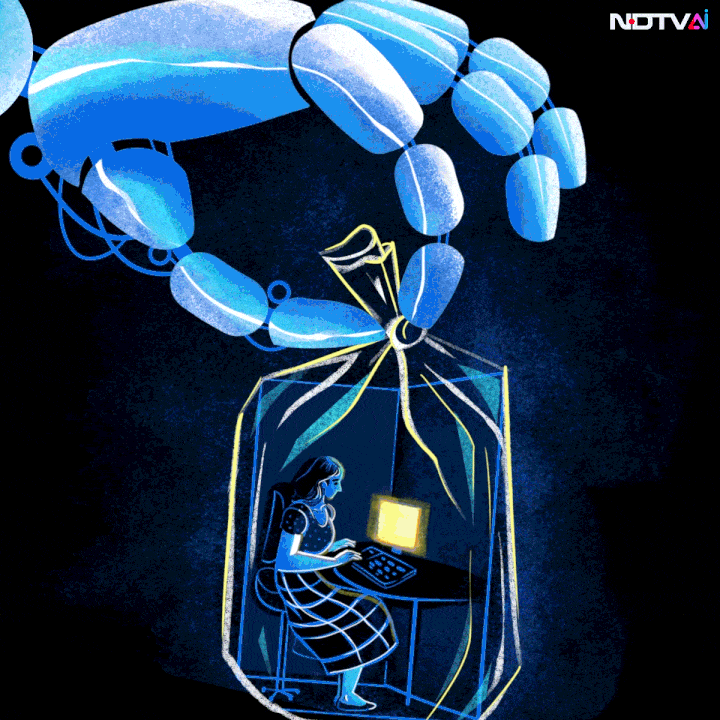
"We had someone coming into our college from South Korea. They have launched an AI app that helps patients understand their medical condition better based on prescriptions and test reports," said Akansha, nuancing her views while voicing concern, "AI is also doing useful work.
(Illustrations by Prajna Ghosh)
Track Latest News Live on NDTV.com and get news updates from India and around the world
